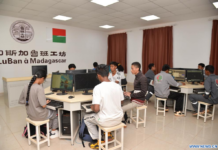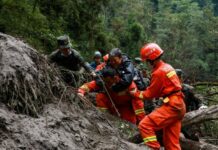A BBC undercover investigation has found evidence of sexual abuse on British-owned Kenyan tea farms
-
A joint BBC Africa Eye and Panorama investigation has spoken to 100 women working on plantations producing tea for world-famous brands, with dozens revealing they are being pressured to have sex with their employer in return for work.
-
Secret footage captures the moment a recruitment manager corners the BBC’s undercover investigator, pinning her against a hotel room window and demanding sex during what was supposed to be a job interview.
-
Women who say they were forced into sex for work at these plantations speak anonymously to the BBC. There are allegations some became pregnant and were infected with HIV.
-
The programme also hears from a group of workers who are filing a lawsuit against one company after developing serious back injuries
A joint BBC Africa Eye and Panorama investigation reveals sexual abuse on British-owned tea farms in Kenya’s Rift Valley. Reporter Tom Odula spent 18 months investigating the tea plantations which supply some of the world’s biggest brands, including PG Tips, Lipton and UK supermarket Sainsbury’s Red label.
The investigation BBC Africa Eye, Sex for Work: The True Cost of Our Tea uncovers the extent of sexual abuse on tea farms.
Kenya is one of the centres of global tea production – an industry worth more than $20bn dollars a year which employs one in ten Kenyans.
Speaking to 100 women who have worked on these farms, more than 70 told the BBC they have suffered some form of sexual harassment at work. They allege managers demand sex in return for jobs, lighter work duties or the renewal of casual employment contracts. There are allegations that some fell pregnant, while others were infected with HIV. One supervisor is even accused of raping a 14 year old girl who was living on site at one of the plantations.
James Finlay & Co
Hidden cameras captured the moment John Chebochok, a recruitment manager for Scottish firm James Finlay and Company, invites the BBC’s undercover investigator “Katy” (not her real name) to a job interview, not on company premises but in a hotel room. Chebochok, then corners “Katy” pinning her against a window as he tries to coerce her into having sex with him. One of the women who works for Chebochok describes him as a ‘predator’.
The footage shows Katy saying she does not consent, but Chebochok persists, asking her to touch him, and telling her: “Consent, just consent. I have helped you, help me. We’ll lie down, finish and go. Then you come and work.”
Katy continues to refuse his advances, and he eventually accepts that she will not sleep with him for work. When she follows up with Chebochok a week later, he ignores her messages before blocking her.
Chebochok did not respond to the allegations.
Another man alleged to be a serial sex abuser is John Asava who, as a supervisor working on plantations owned by James Finlay & Co, oversees more than 100 employees. Candid video footage shows him talking about sexual violence taking place on his plantation, including a case of a woman being gang-raped for hours. He says no one was prosecuted, the company “had to clear its name.” One woman tells the BBC John Asava impregnated her and infected her with HIV. She says he has made seven other women sick with the disease, and she has been left so traumatised by her ordeal that she has contemplated taking her own life.
John Asava said, “I have never sexually harassed anyone in my life. God is my witness.”
Following the BBC’s investigation, James Finlay and Co says it has suspended and barred Chebochok and Asava from its tea farms and reported them to the police. The company also told the BBC that it is investigating whether its Kenyan operation has “an endemic issue with sexual violence.”
In addition to the sexual abuse allegations, the documentary refers to claims of workers suffering serious back injuries working on Finlay’s tea plantations. A £125 million pound class-action lawsuit, filed against James Finlay and Company by up to 2000 current and former employees, is currently making its way through the Scottish courts. Finlays is contesting the action and defends its health and safety record. Up to 2,000 current and former employees allege the company failed in its duty of care; many say they have developed painful spinal condition called Lumbar Myo-spasm.
Joy Temba, one of the lawyers representing the case said: “It is [exploitation]. Unfortunately, you’ll just be here because you still need the money, you still need the food.”
James Finlay and Co is the second largest tea company operating in Kenya’s Rift Valley and supplies tea to Starbucks, as well as Sainsbury’s and Tesco supermarkets.
Responding to the BBC’s findings, Sainsbury’s said: “These horrific allegations have no place in our supply chain.”
Tesco stated that it is in “constant dialogue” with the company to ensure “robust measures” are taken.
Starbucks did not provide a statement.
Unilever
Many of the women BBC Africa Eye spoke to during the investigation work on tea farms which were owned for years by British / Dutch multinational Unilever. It’s been the biggest tea company in the region, producing PG Tips and Lipton Teas since the 1980s. And in a region where one in three adults is unemployed, it’s been the most significant employer for a generation.
The BBC heard from women who have worked for Unilever and felt they had no choice but to give in to their managers’ demands for sex.
Some of the women spoken to by the BBC, name two Unilever bosses in particular, Jeremiah Koskei, a manager and Samuel Yebei, a supervisor, alleging they demanded sex for work.
One woman speaking anonymously says she felt she had no choice but to agree to Koskei’s demands for sex but “lived in fear” of her husband finding out. Several other women the BBC spoke to recount a similar story: Koskei wants to sleep with you and then he will give you a job. He has worked for Unilever for 24 years and had over 800 employees working under him at the time of filming.
Another woman, also speaking anonymously, told the BBC that she gave in to her supervisor Samuel Yebei’s demands, to keep her job. She told the BBC that she subsequently tested HIV positive. She says he told her that she “must give in to him” if she wanted her employment contract to be renewed.
Undercover investigator Katy applies for a job at the Unilever tea farm where Jeremiah Koskei and Samuel Yebei work. Secret footage captures both managers asking her for sexual favours in return for work or lighter duties.
Samuel Yebei denies the allegations made against him. Jeremiah Koskei has not responded to the BBC’s request for comment.
Using Unilever’s zero tolerance policy, Katy reports her managers’ predatory behaviour to one of the company’s sexual harassment officers. But instead of investigating, he tells Katy it is down to her to protect herself. She follows up with him a few days after reporting the behaviour, but no response or action is taken.
Managers demanding sex for work on Unilever farms should have been stopped more than a decade ago. In 2011, a report by the Centre for Research on Multinational Corporations alleged sexual exploitation was “prevalent” on Unilever’s plantations. The company’s zero tolerance policy was launched in response, together with a new reporting system and other measures.
Unilever told the BBC it is “deeply shocked and saddened” by the allegations and said employees who breached its Code of Conduct were dismissed, and any criminality reported to the police. It says it followed the recommendations in the 2011 report and worked to “address gender-based violence against women.” It says it “upgraded the grievance process”, increased training and “improved the gender balance of team members.
During the BBC’s filming, Unilever sold its tea brands and fields to the venture capital company CVC, which operates as Lipton Teas and Infusions.
Lipton Teas and Infusions says it has “immediately suspended the two managers,” and ordered a “full and independent investigation.”
The documentary also explores the economic realities which make women on the plantations vulnerable to abuse. The introduction of mechanical harvesting machines in recent years has led to a dramatic reduction in workforces and has increased competition for jobs in the region. This has increased the pressure on women to have sex in exchange for employment.
Commenting on the impact of job cuts, Eric Mutai, Governor of Kericho County where many of the tea farms are based said: “When the tea estate brought the machines, a total of up to 50,000 casual labourers were sacked…there’s deep pain running within the community.”
During Katy’s time undercover, she met four predatory managers, who between them have worked on Kenyan tea plantations for more than 50 years. They’ve held positions of authority at two leading British companies, leaving countless women who produce tea at risk of abuse.
No one has ever been convicted of sexual harassment or assault on the Kenyan tea plantations owned by Finlays or Unilever. Yet the BBC investigation has shown that the women working in this multi-billion-pound industry, regularly face demands of sex for work.
Brian Olaing, a lawyer for the Kenya Human Rights Commission spoke about the responsibility of multinational companies. He told BBC Africa Eye: “These workers working for some of these multinational companies with big financial power are not able to get justice in our courts [in Kenya].”
Products supplied by both companies are Rainforest Alliance certified. The certification tells consumers the product is green and produced by workers who are well looked after. Mr. Olaing says the companies do not deserve that designation. He said: “If you look at the atrocities committed before these products eventually come to your table, they are heinous crimes.”
Responding to the revelations, the Rainforest Alliance said, “There is no place for sexual abuse or harassment on farms which produce Rainforest Alliance Certified products.” It added: “Protecting women’s rights and promoting gender equality sit at the heart of our certification standard.”



























![Le chocolatier suisse Läderach développe une histoire d’amour avec la Chine [ INTERVIEW ]](https://www.afrique-54.com/wp-content/uploads/2023/12/Johannes-Laderach-et-chocolat-e1702548585357-218x150.jpg)











